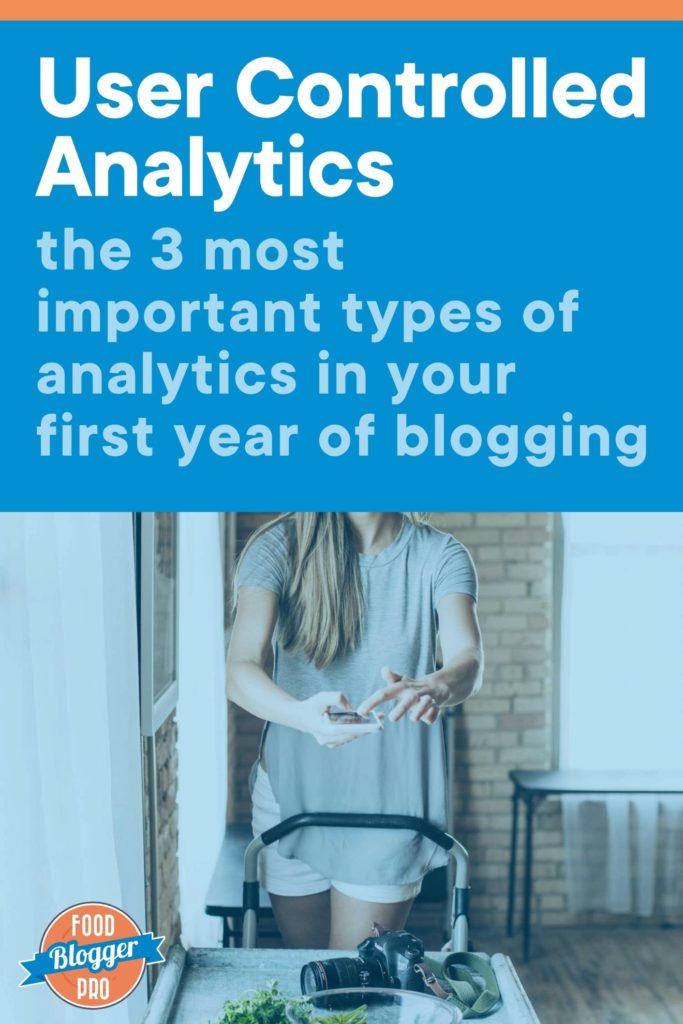
Analytics: The discovery and communication of meaningful patterns in data.
Google Analytics is a funny thing. On one hand, it’s a powerful (free!) tool that offers you seemingly limitless data about your blog. On the other hand, it has the potential to be a huge distraction and an emotional roller coaster, as your mood directly reflects the ups and downs of your blog’s traffic.
If you’re new to blogging I recommend that one of the first things you do is install Google Analytics so it can start collecting data right away. After that, however, I’d do whatever you can to check it as little as possible for the first year of blogging.
Checking your analytics too much can quickly turn into a bit of an addiction. It’s fun to see those numbers go up, but as soon as traffic takes a dip, it’s easy to feel that personally. Not only that, but obsessing over analytics, especially in your first year of blogging, can take your limited time away from the things that can actually move the needle!
As I said before, Google Analytics is an incredible tool. But if you’re using it to just “check your stats,” which in turn distracts you from doing “real work,” then the tool is hurting you more than it’s helping you.
Instead of checking-in on your Google Analytics, you should start checking-in on a different type of analytics: user controlled analytics.
This type of analytics is less about “discovery and communication” and more about “meaningful patterns.” More specifically, it’s about meaningful patterns that you can control.
Here are three important user controlled analytics to track in your first year of blogging:
1. Posting Consistency
Posting consistency is exactly what it sounds like. How consistent are you with posting new (high quality) content to your blog?
On Pinch of Yum, Lindsay has posted consistently over the past 10+ years that the POY team has been growing the blog. Each one of those posts was a building block in the slow (but steady) construction of a successful blog.
I’ve also witnessed it within the Food Blogger Pro community, as members are working hard to stay consistent and publish awesome content for their readers.

If you’re consistent with your posting schedule, your readers will know when to expect you. They’ll start anticipating your new blog posts, trust you more, and be more inclined to share your content with others because they know what to expect from you in the future.
And the great thing about consistency? You can define what “consistent” means to you! If you can post new high quality posts every single day, go for it. If once/week or once/month is more attainable for you, that’s great. You get to decide how consistent you are with your posting schedule.
Daily page views are important, but a more important data point to track is the consistency in which you post to your blog.
2. Amount Invested in Knowledge
Amount invested in knowledge is the number, in time and money, that you spend each month acquiring knowledge.
I don’t have any official stats, but I would be willing to bet that most people (other than college students) spend more money on their cars in an average month than they do on their brains.
Crazy to think about, isn’t it?
Investing in knowledge is priority number one for bloggers.
Why?
Because if you want to become a professional blogger, then you’re wanting to become a knowledge worker.
Knowledge workers are workers whose main capital is knowledge. Typical examples may include software engineers, doctors, architects, engineers, scientists, public accountants, lawyers, teachers, and bloggers, because they “think for a living.” – Wikipedia
Okay, so I added the bold part, but it fits in perfectly, doesn’t it?
The point is this:
As a blogger, your main capital is knowledge.
And, like any other business, without new inventory coming in (i.e. knowledge), you don’t have any inventory to send out. Which is why the amount (of time and money) you invest in acquiring knowledge is an important data point for you to track.
The good news is that I’m not talking about going back to school and getting a degree. I’m talking about a focused, intentional 20–30 minutes a day, everyday, spent acquiring knowledge.
I’m also not talking about spending thousands of dollars on expensive courses. I’m talking about $20 for a book here or $30 for a membership subscription there.
If you’re a food blogger this could mean reading through Amazon’s list of best selling cookbooks. If you’re interested in creating recipe videos for your blog, it could mean watching 2–3 videos a day in the Recipe Video series on Food Blogger Pro or checking out an episode of the Food Blogger Pro Podcast (free!). If you’re wanting to build your YouTube audience, it could mean signing up for LinkedIn Learning for a month and watching the tutorials about video production and YouTube publishing.
We talk a lot about the idea of 1% Infinity here on Food Blogger Pro, and it’s all about making a tiny bit of progress on your goals (1%) every day, forever (Infinity).
This is how we will always approach sustainable and long-term blog growth, and the same principle can be applied to acquiring knowledge. Knowledge should be a life-long pursuit, especially as you’re working towards building a creative outlet like a food blog.
3. Creator Ratio
Here’s how the Creator Ratio works:
You take the amount of time you spend on social media in a given day and divide it by the amount of time that you spend creating content in a day.
Time on Social Media / Time Creating Content

Did you spend an hour on social media and two hours creating content? Then your Creator Ratio 1/2. Your number should always be less than one. The smaller it is, the better.
If you have a high Creator Ratio (anything above one), I encourage you to take a step back and see if all of the time you spend on social media is actually worth your time.
Is social media important? Absolutely. Should you be spending some amount of time on social media to share your content there? Probably.
If used in the right way, social media has the potential to be one of the primary drivers of traffic to your blog. It can also be a place to find inspiration, make connections, and easily get your message out to your audience.
But it also has the potential to be a big ol’ time-suck.
Use the Creator Ratio as a data point to make sure that you’re never spending more time consuming than you are creating.
How about you?
Which one of these three types of “analytics” do you need to focus on the most? Anything you’d add to the list?
I’d love to hear from you in the comments below.
Love this list -as with all your resources they’re super helpful!
I recently started investing more in self knowledge…I’ve purchased a ton of ebooks, books, and video courses, now I just need to find the time to sit down and learn 😉 But in all honesty, even though I’ve had to spend a little money, the things I’m learning have been totally worth the investment!
Thanks as always Bjork for the great content you put out into the world to help food bloggers like myself improve their blogs
I’ve found the same to be try Phi! I’m always a little bit hesitant when spending money but I’ve almost always found the payoff (i.e. knowledge gained, which often times turns into income…) to be worth it.
What an inspiring post! I love that you are encouraging us to take a long term view and invest our time and energy into activities that will reap rewards long into the future. Thanks for sharing your wisdom, Bjork.
Thanks for checking it out Stacia! 🙂
All great points, Bjork! I really connected with the posting consistently metric, it’s the hardest one for me right now. Another great reason for me to keep my eyes out of Google Analytics, which I admit, after my fast, I’ve checked, but not nearly as often as before. Thanks so much for the shout-out, what a nice surprise! High-five right back at ya!
You and I both Beth. 🙂 Posting consistent is my focus for FBP this summer and fall.
really interesting as always… I think I spend too much time on social network and on analytics. Thanks for making me look at things in a different way 😀
Glad to hear that the post had an impact Anna. 🙂
Have you gone a month without checking your stats? That might be hard to do, but I see that I need to work on all 3 of these things.
What a useful article, still in 2019! 🙂 I want to print it and stick on my fridge haha
This is great information! Thank you Alexa!
Thanks for checking it out, Tara! 🙂